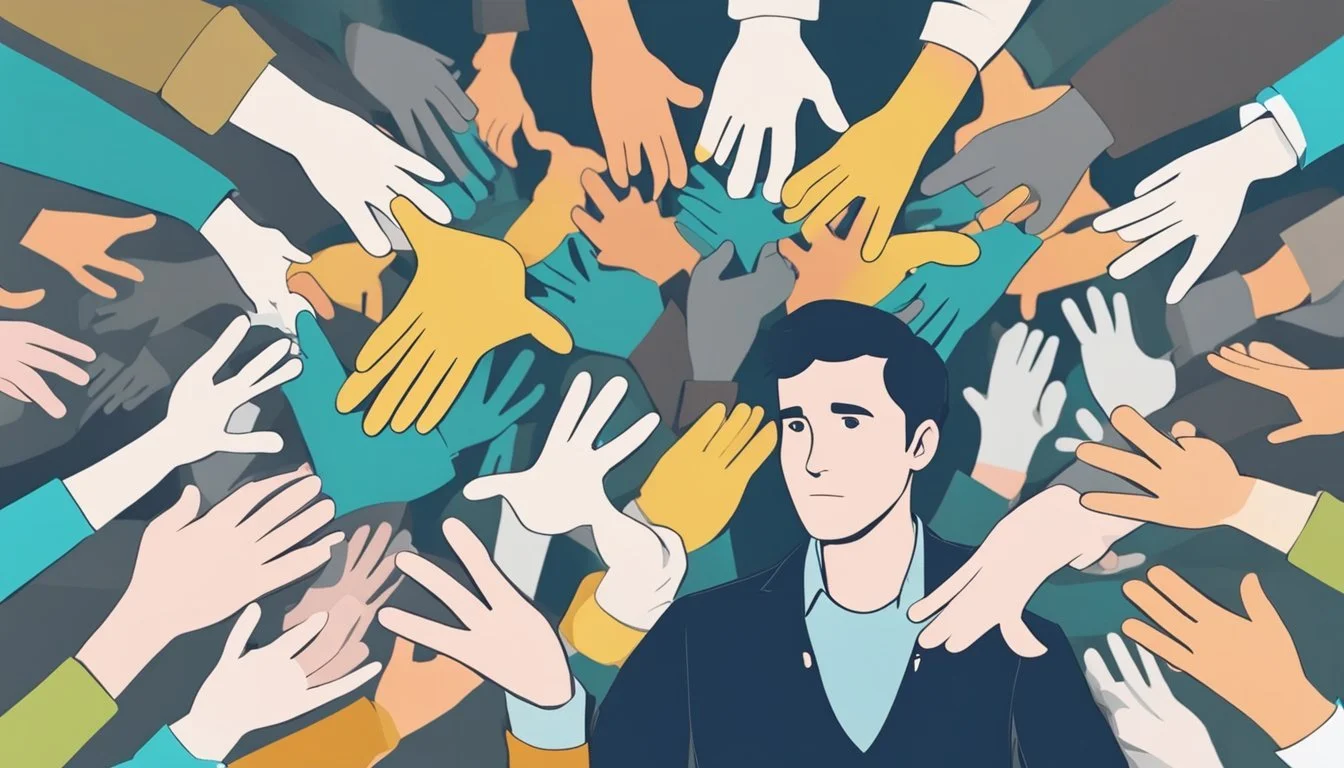10 Signs of a Fake Friend
Essential Tips to Identify One
Navigating friendships can sometimes be challenging, especially when it comes to identifying genuine connections among your social circle. While having a diverse group of friends can enrich your life, it's crucial to be aware of the signs that might indicate a person is not truly trustworthy.
Being able to spot a fake friend can save you from unnecessary stress and disappointment. Recognizing these signs can help you maintain healthier relationships and ensure that you are surrounded by people who genuinely care about your well-being.
1) Constantly Undermine Your Achievements
A fake friend often downplays your successes. They might compliment you initially, but their praise lacks sincerity. Instead of celebrating your accomplishments, they quickly shift the focus back to themselves.
Their remarks may seem supportive, but they often contain subtle jabs. Phrases like "That's great, but it's not that big of a deal" are common. This behavior can erode your confidence over time.
During conversations, they may interrupt to highlight their own achievements. By doing so, they minimize your hard work and efforts. It's a tactic to ensure they remain the center of attention.
A fake friend might also spread negative comments about your achievements to others. This gossip aims to belittle your success and cast doubt on your abilities. Recognize this pattern as a clear sign of envy.
For more on identifying fake friends, visit Verywell Mind.
2) Talk about you behind your back
A common sign of a fake friend is when they talk about you behind your back. This behavior often involves sharing your private information or secrets with others. They may also spread rumors or negative comments about you to make themselves look better.
Such individuals can cause emotional harm by undermining your trust. Their actions can create divisions in your social group, leading to feelings of isolation and betrayal. This behavior is not only disrespectful but also detrimental to the trust crucial for any genuine friendship.
Fake friends might engage in gossip to manipulate situations for their benefit. For example, they might twist your words or actions to portray you negatively. This manipulation harms your reputation and can create misunderstandings that are hard to resolve.
Recognizing this behavior early can prevent further emotional damage. Genuine friends will always respect your privacy and speak well of you when you are not present. Identifying and addressing these signs can help maintain healthier, more trustworthy relationships.
Talking behind someone's back often stems from insecurity or a desire to gain social leverage. Avoiding such toxic relationships can contribute to a more supportive and positive social environment.
3) Only contact you when they need something
Fake friends tend to reach out solely when they have a need. They often vanish when the tables turn, demonstrating inconsistency in their availability. Genuine friendships thrive on mutual support, but these individuals are conspicuously absent during your times of need.
This behavior can lead to a one-sided relationship where your friend only engages with you for their benefit. They may call or text asking for favors, advice, or emotional support but rarely reciprocate. The imbalance often results in feelings of being used and unappreciated.
Sometimes, the requests from a fake friend can be outright demanding, prioritizing their needs above your own. The pattern becomes evident over time as you find yourself always giving while receiving little in return. The lack of genuine connection erodes trust, making the relationship feel transactional.
Recognizing such imbalanced interactions can be pivotal. It's essential to assess whether the relationship adds value to your life or depletes your emotional resources. True friends value your well-being and maintain equitable support. The presence of these patterns is a clear indicator of a fake friend.
4) Never support your goals
A fake friend often shows little to no interest in your aspirations and ambitions. They might dismiss your goals as unimportant or unrealistic. This lack of encouragement can be disheartening and may hinder your confidence in pursuing what matters to you.
When you share your achievements or plans, they may respond with indifference or even skepticism. Instead of celebrating your successes, they might downplay them or shift the focus back to themselves. This behavior can make you feel undervalued and unsupported.
You may also notice that a fake friend offers no constructive feedback or assistance. They won't go out of their way to help you advance in your career, education, or personal growth. Their actions (or lack thereof) reveal a fundamental lack of investment in your well-being.
According to experts, this pattern of behavior is common among fake friends, as their primary concern is often their own needs and desires. Recognizing this sign can help you take a step back and evaluate the true nature of your friendships. Identifying such traits early on is crucial for fostering healthier, more supportive relationships.
For more information on spotting signs of a fake friend, you can visit this article.
5) Make you feel guilty for their problems
Fake friends often make you feel responsible for their issues. They might blame you for their bad luck or difficult situations, creating a sense of guilt in you. This manipulative behavior is intended to control how you feel and act.
They could use passive-aggressive comments or even direct accusations. For instance, they might say, "If only you had been there, this wouldn’t have happened." Such remarks can make you question your actions and feel undeserved guilt.
This behavior is common in those who seek attention and validation. They want you to feel obligated to help them, thereby boosting their own self-worth. This one-sided dynamic is a clear sign of a fake friendship.
By constantly placing blame on you, they avoid taking responsibility for their actions. This can drain your emotional energy and create an unhealthy relationship dynamic. For more on this type of behavior, visit Verywell Mind's article.
Real friends hold themselves accountable and don’t burden you with their problems. Recognizing this sign can help you protect your mental well-being and maintain healthier relationships.
6) Break promises frequently
One significant sign of a fake friend is their tendency to break promises. Consistently failing to follow through on commitments reveals a lack of reliability and respect.
A true friend values their word and strives to keep their promises. Fake friends, on the other hand, often make excuses or simply ignore their broken commitments.
The habit of breaking promises can erode trust quickly. It makes you question their sincerity and integrity. This behavior signifies a lack of genuine intention in maintaining the relationship.
You may notice that they promise something in the moment to appease you. Yet when the time comes, they conveniently forget or find reasons not to fulfill their promise.
This pattern can manifest in various ways, from small social commitments to more significant obligations. Over time, it becomes clear that their words are hollow.
7) Always Play the Victim
Fake friends often exhibit victim mentality. They frequently portray themselves as innocent sufferers of circumstances beyond their control.
This behavior manipulates others into feeling sorry for them and offering support without reciprocation.
When confronted about any wrong, they twist the situation to avoid accountability. This deflection prevents any real resolution and keeps the focus on their perceived hardships.
They lack a sense of limits in relationships, constantly needing reassurance and attention. This drains their friends emotionally and mentally.
Understanding these signs can help identify and distance oneself from such toxic relationships. "Playing the victim" is a common trait among fake friends. Spotting it can protect one's emotional wellbeing.
This pattern of behavior can also be seen when they fabricate or exaggerate problems to draw sympathy. They often craft elaborate stories to evoke concern and avoid responsibility.
To learn more about how individuals exhibit these traits, refer to LifeHack's guide on playing the victim.
Recognizing this behavior is crucial in evaluating and maintaining healthy friendships.
8) Never Celebrate Your Victories
Fake friends often reveal their true nature when it's time to celebrate your achievements. When something good happens to you, they might seem uninterested or even envious. Celebrating victories is a key part of any genuine friendship.
If your friend never shows genuine happiness for your successes, it could be a red flag. They might downplay your achievements or change the subject to themselves. These behaviors can make you feel unsupported.
True friends celebrate with you. They share in your joy and show excitement for your achievements. If someone consistently avoids or minimizes your victories, it may be time to question their intentions.
In some cases, a fake friend might even make negative comments about your success. This can come across as jealousy or resentment. They may mask their negativity as "honesty" or "just being real."
Real friends lift you up during your high moments. They don't let their feelings overshadow your achievements. Observing how a friend reacts to your successes can provide valuable insights into the authenticity of the friendship. Being mindful of these signs can help you maintain healthier and more supportive relationships.
9) Avoid spending quality time together
A key sign of a fake friend is their tendency to avoid spending quality time together. They are often too busy or have countless excuses.
While real friends make an effort to be part of each other’s lives, fake friends lack this initiative. They might ignore invitations or cancel plans last minute.
This avoidance isn’t just about busy schedules. It indicates a deeper lack of interest in the relationship. They may prefer to engage only when it benefits them.
Such friends rarely prioritize one-on-one time. Group activities might be acceptable to them, but solo outings are frequently brushed aside.
Instead of emotional connection, their focus often lies elsewhere. The relationship feels superficial as genuine bonding moments become rare. This behavior can leave one feeling undervalued and neglected.
Lack of willingness to spend quality time is a clear indicator. Identifying this pattern can be crucial in evaluating the authenticity of a friendship.
For more insights, you can refer to the signs of a fake friend.
10) Exclude you from group plans
Fake friends may exclude you from group plans, making you feel isolated and unimportant.
This exclusion tactic can be subtle, such as making plans without you or not informing you about gatherings. It can also be more obvious, like outright telling you that you aren't invited.
When confronted, they may provide insincere excuses. They might say they thought you were busy or assumed you wouldn’t be interested. This behavior indicates a lack of consideration for your feelings.
It's possible they might share details about the event afterward, rubbing it in. This can further highlight their disregard for including you in the social circle.
Repeatedly being left out of group activities reveals the true nature of the relationship. Genuine friends ensure everyone feels included and valued, while fake friends do not prioritize your presence. Consistent exclusion reflects underlying issues in the friendship.
This behavior is a clear signal that the relationship isn’t mutually supportive. It's crucial to recognize these patterns and reassess the worthiness of such friendships. Understanding this sign can help in making better choices about who to invest time and energy in.
Understanding the Traits of a Genuine Friendship
A genuine friendship is characterized by mutual trust, respect, and unwavering support. It's important to recognize these qualities to distinguish real friends from fake ones, ensuring healthy and fulfilling relationships.
Importance of Trust and Respect
Trust forms the cornerstone of any authentic friendship. Genuine friends can confide in each other without fearing betrayal or judgment. This openness fosters a safe environment where both parties feel valued and understood.
Respect is equally vital. True friends honor each other’s boundaries and opinions, even when they disagree. This respect extends to their actions and words, consistently showing appreciation for one another's individuality and choices. It's about mutual acknowledgment and a strong commitment to preserving each other's dignity.
Mutual Support and Encouragement
Support in a genuine friendship is unwavering, encompassing both joyous and challenging times. Real friends are present during celebrations and stand firm during hardships. Their support is practical and emotional, providing assistance when needed and a shoulder to lean on.
Encouragement plays a crucial role as well. True friends believe in each other's potential and consistently offer motivation. They celebrate successes and provide constructive feedback to help each other grow. This positive reinforcement creates a nurturing space where both individuals can thrive and reach their goals.
Identifying Red Flags in Friendships
Recognizing fake friends involves observing patterns such as inconsistent communication, predominantly self-centered conversations, and a clear lack of reciprocal support.
Inconsistent Communication
Fake friends often display erratic communication patterns. They might be highly responsive when they need something but become unresponsive or vanish when you need assistance. This inconsistency can be particularly noticeable during times of personal hardship or celebration. When they are absent during significant moments or emergencies, it highlights a lack of genuine commitment.
In addition to this, fake friends might make frequent excuses to avoid spending time or communicating, illustrating that the friendship's basis is superficial. Regularly noticing these patterns can indicate that the friend may not be dependable.
Self-Centered Behavior
Self-centered behavior is another hallmark of fake friends. Conversations with such individuals are often one-sided. They focus primarily on their own life, achievements, and problems, with little regard for your experiences or emotions. This tendency to dominate discussions and shift the attention back to themselves can be draining and disheartening for the other person involved.
A self-centered friend may also demonstrate jealousy when you succeed, subtly undermining your achievements rather than genuinely celebrating them. This trait reflects their inability to appreciate or support your success, further indicating a lack of true friendship.
Lack of Reciprocity
A genuine friendship involves mutual support and equal effort from both parties. Fake friends, however, often fail to reciprocate favors, emotional support, or attention. They might consistently take advantage of your generosity and kindness without showing appreciation or returning the favor in any meaningful way.
When the relationship feels one-sided, with them constantly taking and seldom giving, it can signify a lack of authenticity. Noticing a pattern of taking without giving back in any form—whether emotional, practical, or even just in terms of time—can be a strong indicator of a fake friendship. This lack of reciprocity ultimately undermines trust and balance in the relationship.
Long-Term Consequences of Fake Friendships
Fake friendships, over time, can have numerous negative impacts on one's mental and emotional well-being.
Erosion of Trust: Repeated interactions with fake friends can slowly erode a person's ability to trust others. Over time, this can lead to difficulties in forming genuine relationships.
Increased Stress and Anxiety: Consistently dealing with a fake friend can increase personal stress and anxiety levels. The constant questioning of motives and intentions can be mentally exhausting.
Lower Self-Esteem: Fake friends often make others feel bad about themselves, which can contribute to poorer self-esteem. This is particularly harmful in long-term scenarios where the individual repeatedly feels unworthy or inferior.
Social Isolation: The realization that a friend is fake can lead to social isolation. The individual might withdraw from social activities to avoid further hurt and disappointment.
Negative Impact on Mental Health: Long-term exposure to fake friendships can have a significant impact on mental health, potentially leading to conditions such as depression. Constant negativity and betrayal can take a heavy toll.
Loss of Support System: Genuine friends provide a support system during tough times. Fake friends, who disappear during crises, leave individuals without essential emotional support when it is most needed.
Difficulty Trusting in Future Relationships: Encountering multiple fake friendships can cause one to approach new relationships with skepticism, affecting the ability to build healthy future friendships.
Understanding these long-term consequences highlights the importance of recognizing and addressing fake friendships early on.










